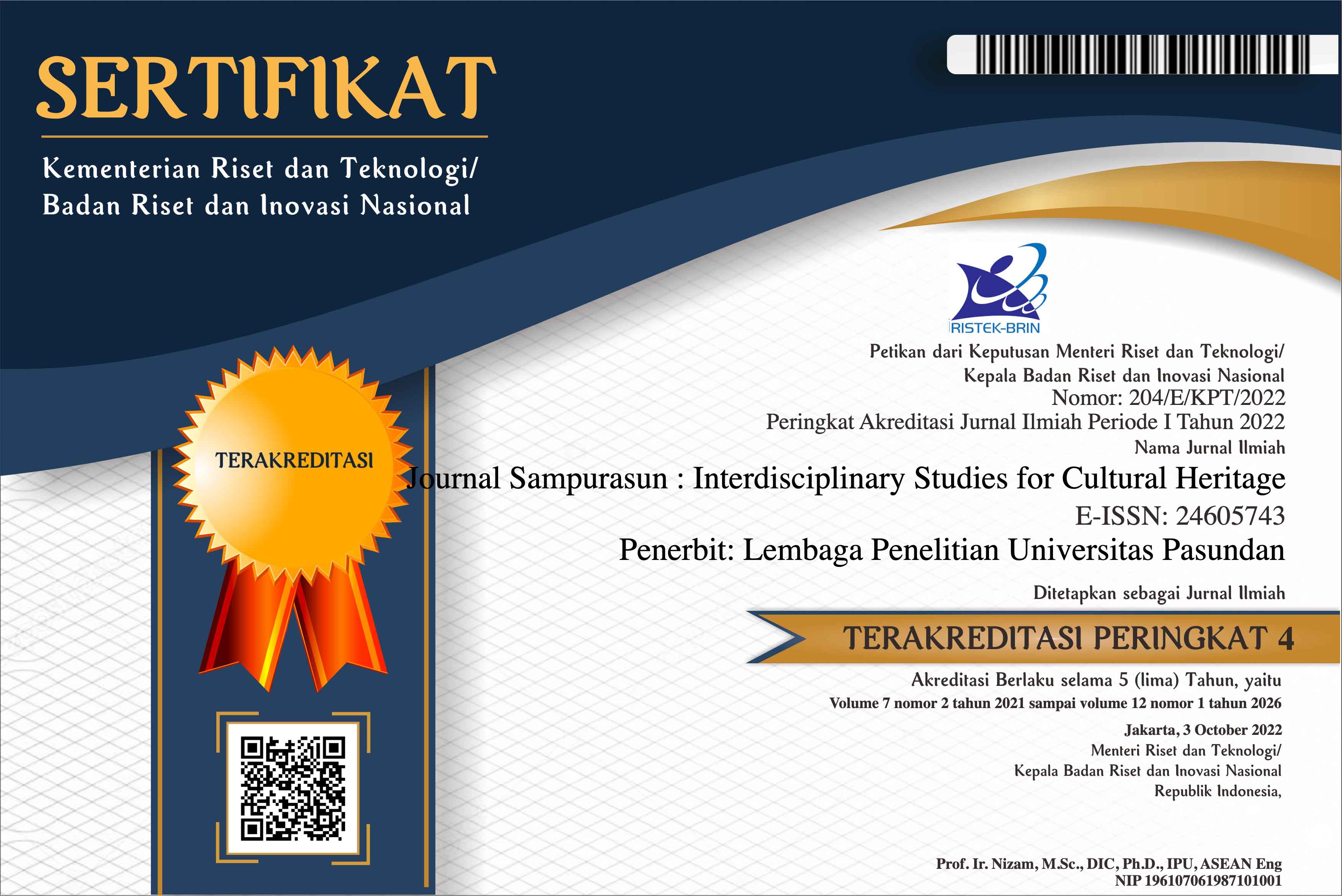SETTING OF DEVELOPED COUNTRY IN DRAMA SCRIPT “NYAYIAN RIMBAYANA” (A Study of Roland Barthes’ Semiotics with Myth of Liberal Capitalism)
DOI:
https://doi.org/10.23969/sampurasun.v3i1.250Abstract
The analysis of this research basically concerns issue of setting of developed country which is depicted through the sign systems found in the drama script “Nyayian Rimbayana”. Principally, the research is a descriptive qualitative research with Roland Barthes’s semiotics as the main tool to examine the data. The sign systems detected are interpreted in two orders of significations (language level and myth level). Observed based on the myth of liberal capitalism, the setting of developed country illustrated through the sign systems are specifically in principles of modernity of infrastructure (infrastructure appearance); diversity of social class, capital force (social class); mercantilism, non-intervention of government, policies of encouragement, the disregard of domestic policies, and non-inward-looking development policies (leader role); and market force, free market system, openness of country’s economies, profit motive, private ownership property, and no legal limit on the accumulation of property (industrial prototype).
Key words: Drama, semiotics, developed country, liberal capitalism.
Downloads
References
Ball, T., Dagger, R. and O’Neill, D.I. 2013. Political Ideologies and Democratic Ideal (Ninth Edition). USA: Pearson.
Barthes, Roland. 1972. Mythologies. New York: The Noonday Press
Berger, Peter L. 1990. Revolusi Kapitalis (Edisi Terjemahan: Mohammad Oemar). Jakarta: LP3S.
Cohen, L., Manion, L. and Morrison, K. 2007. Research Methods in Education (Sixth Edition). New York: Routledge.
Eagleton, Terry. 1996. Literary Theory: An Introduction (Second Edition). USA: The University of Minnesota Press.
Eco, Umberto. 1976. A theory of Semiotics. London: Indiana University Press
Endaswara, Swardi. 2013. Teori Kritik Sastra: Prinsip, Falsafah, dan Penerapan. Yogyakarta: CPAS.
Fatah, Sanusi, et al. 2008. Ilmu Pengetahuan Sosial: Untuk SMPM/MTs Kelas IX. Jakarta: Pusat perbukuan, Departemen Pendidikan Nasional.
Habib, Rafey. 2005. A History of Literary Criticism: From Plato to the Present. USA: Blackwell Publishing Ltd.
Heywood, Andrew. 2003. Political Ideologies: An Introduction (Third Edition). New York: Palgrave Macmillan.
Jalidu, Ahmad. 2009. Nyanyian Rimbayana (Naskah Drama). Yogyakarta: Unpublished
Lippit, Victor D. 2005. Capitalism. New York. Routledge.
Polit, D.F. and Beck, C.T. 2003. Nursing Research, Principles and Methods (Seventh Edition). Philadelphia, USA: Lippincott Williams & Wilkins.
Pradopo, Rachmat Djoko. 2002. Kritik Sastra Indonesia Modern. Yogyakarta: Gama Media.
Reisman, George. 1998. Capitalism.A Treatise on Economics.USA: TJS Books.
Reksohadiprodjo, Sukanto. 2001. Ekonomi Publik (Edisi Pertama). Yogyakarta: BPFE – Yogyakarta.
Sargent, L. T. 2009. Political Ideologies: A Comparative Analysis (Fourteenth Edition). USA: Wadsworth
Staniland, Martin. 2003. Apakah Ekonomi Politik itu? Sebuah Studi Sosial dan Keterbelakangan (Edisi Terjemahan: Haris Munandar dan Dudy Priatna). Jakarta: PT. Rajagrafindo Persada.
Sutarto, et al. 2008. IPS 3: Untuk SMP/MTs Kelas IX. Jakarta: Pusat Perbukuan, Departemen Pendidikan Nasional.
Todaro, M.P. and Smith, S.C. 2012. Economic Development (Eleventh Edition). USA: Pearson.
Downloads
Published
Issue
Section
License
Copyright Notice
Authors should not withdraw their submitted papers because the withdrawal wastes voluntary works devoted by an associate editor and reviewers. But, we accept the withdrawal of a submitted paper if authors have unavoidable reasons. In the event that a manuscript is to be withdrawn from submission to Sampurasun Journal, a letter must be sent to the editorial office requesting withdrawal by e-mail (sampurasunjournal@unpas.ac.id) with its scanned PDF file, before the notification of acceptance for publication.
The withdraw request letter must include the following information. Paper ID, Paper title, Authors names, Reason why the paper must be withdrawn, and Date and signatures of all the authors (or signature of the contact author).
If only the contact author signs the letter, he/she must obtain the agreement of the withdrawal from all the other authors and the letter must include the description that all the other authors agreed the withdrawal. The journal will not withdraw a manuscript from peer review until such a letter has been received. Authors must not assume their manuscript has been withdrawn until they have received appropriate notification from the editorial office. Withdrawal of a manuscript subsequent to acceptance for publication will only be granted in the most exceptional of circumstances.
After the paper is accepted for publication, the withdrawal is not permitted in principle. The authors must always pay the charge even if the withdrawal is permitted. Any request of withdrawal that does not follow the above procedure is treated as invalid. If illegal submission, e.g., plagiarized or duplicate submission, is found for a paper, the withdrawal of the paper will never be permitted and the authors will be punished based on the rule. It is not acceptable practice to withdraw a manuscript in the event of acceptance at another journal. This constitutes dual submission. The editorial office of the other journal will be notified of your actions. In such circumstances Sampurasun ISCH may chose to impose appropriate punitive action subject.
Withdrawal Penalty
Author is not allowed to withdraw submitted manuscripts, because the withdrawal is waste of valuable resources that editors and referees spent a great deal of time processing submitted manuscript, money and works invested by the publisher. If author still requests withdrawal of his/her manuscript when the manuscript is still in the peer-reviewing process, author will be punished with paying $200 per manuscript, as withdrawal penalty to the publisher. However, it is unethical to withdraw a submitted manuscript from one journal if accepted by another journal. The withdrawal of manuscript after the manuscript is accepted for publication, author will be punished by paying US$500 per manuscript. Withdrawal of manuscript is only allowed after withdrawal penalty has been fully paid to the Publisher. If author don't agree to pay the penalty, the author and his/her affiliation will be blacklisted for publication in this journal. Even, his/her previously published articles will be removed from our online system.


















